
{Important Update About Penguin: Read John Mueller’s latest comments about the Penguin algorithm.}
I just returned from SES Atlanta, where I presented “How To Avoid and Recover From Panda, Penguin, and Manual Actions”. The conference was outstanding, included a killer keynote by Duane Forrester and sessions packed with valuable information about SEO and SEM. By the way, I entered my hotel room in Atlanta and immediately saw a magazine on the desk. The photo above is the cover of that magazine! Yes, a Panda was on the cover. You can’t make this stuff up. :)
During (and after) my presentation about algorithm updates and penalties, I received a number of outstanding questions from audience members. And later in the day, I led a roundtable that focused on Panda and Penguin. There were also some great conversations during the roundtable from business owners and marketers across industries. It’s always interesting to hear top marketer concerns about major algorithm updates like Panda and Penguin (and especially Panda 4.0 which just rolled out in late May). We had a lively conversation for sure.
On the plane flight home, I started thinking about the various questions I was asked, which areas were the most confusing for marketers, and the tips and recommendations I was sharing. And based on that list, I couldn’t help but think a Q&A style blog post could be very helpful for others dealing with Panda, Penguin, and manual actions. So, I decided to write this post covering a number of those questions. I can’t cover everything that I spoke about at SES Atlanta (or this post would be huge), but I can definitely provide some important tips and recommendations based on questions I received during the conference. Let’s jump in.
Algorithm Updates and Manual Actions – Q&A From SES Atlanta
Question: I’ve been hit by Panda 4.0. What should I do with “thin content” or “low-quality” content I find on my website? Is it better to nuke the content (404 or 410), noindex it, or should I redirect that content to other pages on my site?
Glenn: I hear this question often from Panda victims, and I know it’s a confusing topic. My recommendation is to remove thin and low-quality content you find on your site. That means 404 or 410 the content or noindex the content via the meta robots tag. When you have a content quality problem on your site, you need to remove that content from Google’s index. In my experience with helping companies recover from Panda, this has been the best path to take.
That said, if you find content that’s thin, but you feel you can enhance that content, go for it. If you believe the content could ultimately hold information that people are searching for, then beef it up. Just make sure you do a thorough job of developing the additional content. Don’t replace thin content with slightly thin content. Create killer content instead. If you can’t, then reference my first point about nuking the content.
Also, it’s important to ensure you are removing the right content… I’ve seen companies nuke content that was actually fine thinking it was low-quality for some reason. That’s why it’s often helpful to have an objective third party analyze the situation. Business owners and marketers are often too close to their own websites and content to objectively rate it.
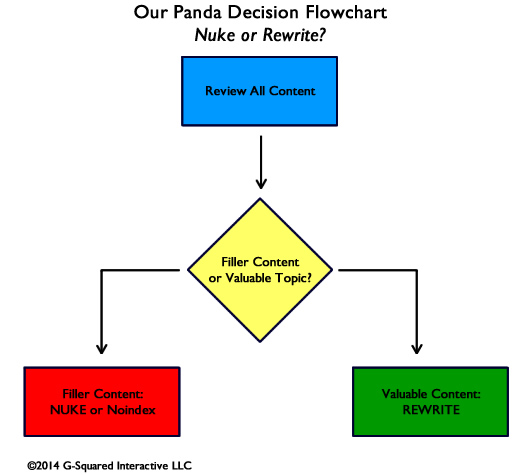
Question: How come I haven’t seen a Panda recovery yet even though I quickly made changes? I was expecting to recover during the next Panda update once the changes were implemented.
Glenn: This is another common question from Panda victims. It’s important to understand that completing the changes alone isn’t enough. Google first needs to recrawl the site and the changes you implemented. Then it needs to better understand user engagement based on the changes. I’ve explained many times in my blog posts about Panda that the algorithm is heavily focused on user engagement. So just making changes on your site doesn’t provide Google enough information.
Panda recovery can take time. Just read my case study about 6 months with Panda. That was an extreme situation in my opinion, but it’s a great example of how long it can take to recover.
Second, Panda roughly rolls out once per month. You need an update to occur before you can see changes. But that’s not a hard rule. John Mueller from Google clarified the “Panda Tremors” I have been seeing since Panda 4.0, and explained that there isn’t a fixed frequency for algorithm updates like Panda. Instead, Google can continue to tweak the algo to ensure it yields the desired results. Translation: you might see turbulence after a Panda hit (and you may see increases or decreases as the tremors continue).
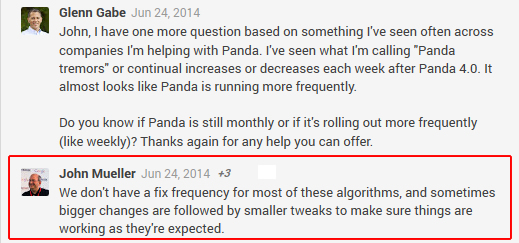
And third, you might see smaller recoveries over time during subsequent updates (versus a full recovery in one shot). I’ve had several clients increase with subsequent Panda updates, but it took 4-5 updates for them to fully recover. So keep in mind that you might not see full recovery in one shot.
Question: We know we have an unnatural links problem, and that we were hit by Penguin, but should we tackle the links problem or just build new links to balance out our link profile?
Glenn: I’ve seen many companies that were hit by Penguin avoid tackling the root problem, and instead, just try and build new links to balance out their link profile. In my opinion, that’s the wrong way to go. I always recommend aggressively handling the unnatural links situation, since that’s the most direct path to Penguin recovery.
And to clarify, you should still be pumping out killer content, using Social to get the word out, etc. I always tell clients impacted by Penguin or Panda to act like they aren’t impacted at all. Keep driving forward with new content, sharing via social media, connecting with users, etc. Fresh links and shares will be a natural side effect, and can help the situation for sure. And then the content they are building while under the Penguin filter could end up ranking well down the line. It’s hard to act like you’re not hit, but that’s exactly what you need to do. You need to be mentally tough.
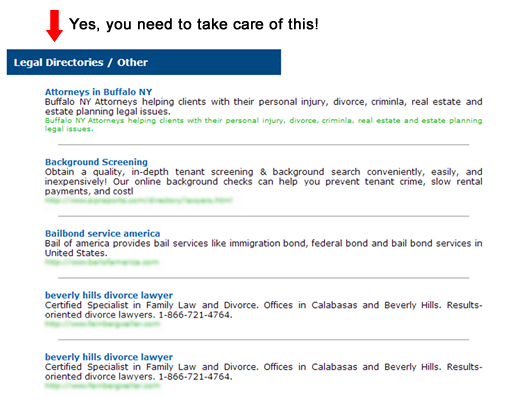
Question: Is it ok to remove content from Google’s index? Will that send strange signals to the engines?
Glenn: Nuke it. It’s totally fine to do so, and I’ll go even further and say it could be a great thing to do. I mentioned this several times in my Panda 4.0 findings, but the right indexation is more important than high indexation. In other words, make sure Google has your best content indexed, and not thin, duplicate, or other low-quality content.
I had one client drop their indexation by 83% after being impacted by Phantom and Panda, and they are doing extremely well now Google organic-wise. I love the screenshot below. It goes against what many marketers would think. Lower indexation = more Google traffic. That’s awesome.
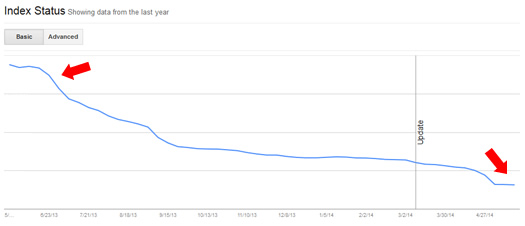
Question: We consume a lot of syndicated content. What’s the best way to handle attribution?
Glenn: I saw a number of sites get smoked during Panda 4.0 that were consuming a lot of syndicated content and not handling that properly SEO-wise. The best way to handle attribution for syndicated content is to use the cross domain canonical url tag pointing to the original article. If you can’t do that (or don’t want to do that), then you can keep the content out of Google’s index by noindexing it via the meta robots tag.
It’s not your content, so you shouldn’t be taking credit for it. That said, if set up correctly, it’s fine to have syndicated content on your site for users to read. But the proper attribution is important or it can look like you are copying or scraping content. I know that won’t go over well for ad teams looking to rank in organic search (to gain more pageviews), but again, it’s not your content to begin with.
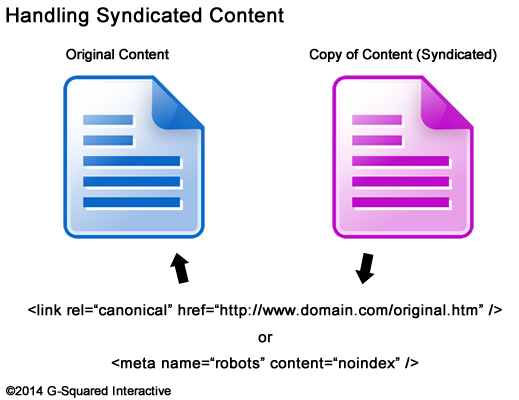
Question: Why hasn’t there been a Penguin update since October of 2013? What’s going on? And will there ever be another update?
Glenn: It’s been a long time since the last Penguin update (October 4, 2013). Like many others heavily involved with Penguin work, I’m surprised it has taken so long for another update.
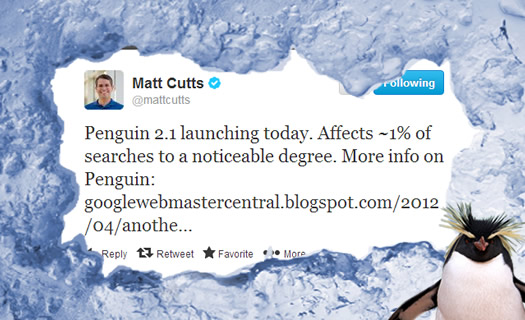
Matt Cutts recently explained at SMX Advanced that they have been heavily working on Panda 4.0, so Penguin has taken a back seat. But he also said that an engineer came up to him recently and said, “it’s probably time for a Penguin update”. That situation is both positive and scary at the same time.
On the one hand, at least someone is thinking about Penguin on the webspam team! But on the flip side, they clearly haven’t been focusing on Penguin for some time (while many Penguin victims sit waiting for an update). On that note, there are many webmasters who have rectified their unnatural link problems, disavowed domains, urls, etc., and are eagerly awaiting a Penguin update. It’s not exactly fair that Google has been making those business owners wait so long for Penguin to roll out again.
Now, there’s always a possibility that there is a problem with the Penguin algorithm. Let’s face it, there’s no reason it should take so long in between updates. I’m wondering if they are testing Penguin and simply not happy with the results. If that’s the case, then I could see why they would hold off on unleashing a new update (since it could wreak havoc on the web). But that’s just speculation.
In my opinion, it’s not cool to let Penguin victims that have worked hard to fix their link problems sit in Penguin limbo. So either Google is seriously punishing them for the long-term, they have put the algo on the back burner while focusing on other algos like Panda, or Penguin is not up to par right now. Remember, if Google isn’t happy with the results, then they don’t have to push it out. And if that’s the case, Penguin victims could sit in limbo for a long time (even longer than the 9 months they have waited so far.) Not good, to say the least.
Important Penguin Update: Google’s John Mueller provided more information about the Penguin algorithm on today’s Webmaster Central Office Hours Hangout.
John was asked if Penguin would be released again or if it was being retired. And if it was being “retired”, then would Google at least run it one more time to free those webmasters that had cleaned up their link profiles. John explained that Penguin was not being retired. Let me say that again. he said Penguin is not being retired. John explained that it can sometimes take longer than expected to prepare the algorithm and update the necessary data. He also explained that if Google were to retire an algorithm, then they would “remove it completely” (essentially removing any effect from the algorithm that was in place).
So we have good news on several fronts. Penguin is still alive and well. And if Google did retire the algo, then the effect from Penguin would be removed. Let’s hope another Penguin update rolls out soon.
You can view the video below (starting at 5:16) or you can watch on YouTube -> https://www.youtube.com/watch?v=8r3IIPCHt0E&t=5m16s

Question: We’ve been hit by both Panda and Penguin. We don’t have a lot of resources to help with recovery, so which one do we tackle first?
Glenn: I’ve helped a number of companies with Pandeguin problems over the years, and it’s definitely a frustrating situation for business owners. When companies don’t have resources to tackle both situations at the same time, then I’ve always been a big fan of tackling the most acute situation first, which is Penguin.

Panda is a beast, and has many tentacles. And Penguin is all about unnatural links (based on my analysis of over 400 sites hit by Penguin since April 24, 2012). That’s why I recommend focusing on Penguin first (if you can’t knock out both situations at once). I recommend aggressively tackling unnatural links, remove as many spammy links as you can, and then disavow the remaining ones you can’t get to manually. Then set up a process for monitoring your link profile over time (to ensure new unnatural links don’t pop up).
After which, you can tackle the Panda problem. I would begin with a comprehensive Panda audit, identify the potential problems causing the Panda hit, and aggressively attack the situation (the bamboo). Move quickly and aggressively. Get out of the grey area of Panda (it’s a maddening place to live).
Question: Is linkbuilding dead? Should I even focus on building links anymore and how do I go about doing that naturally?
Glenn: Links are not dead! The right links are even more important now. I know there’s a lot of fear and confusion about linkbuilding since Google has waged war on unnatural links, but to me, that makes high quality links even more powerful.
Duane Forrester wrote a post recently on the Bing Webmaster Blog where he explained if you know where a link is coming from prior to gaining that link, then you are already going down the wrong path. That was a bold statement, but I tend to agree with him.
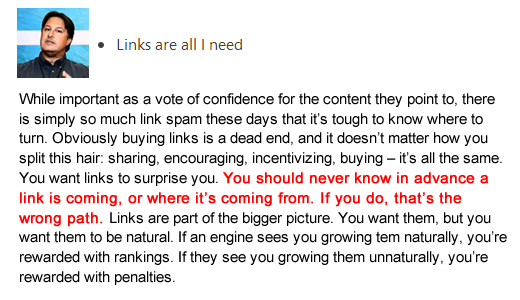
I had several conversations about this topic at SES Atlanta. To me, if you build killer content that helps your target audience, that addresses pain points, and teaches users how to accomplish something, then there’s a good chance you’ll build links. It’s not the quantity of links either… it’s the quality. I’d rather see a client build one solid link from a site in their niche versus 1000 junky links. The junky links are Penguin food, while the solid link is gold.
Question: I was hit by Panda, but my core competitors have the same problems we do. We followed what they were implementing, and we got hit. Why didn’t they get hit? And moving forward, should we follow others that are doing well SEO-wise?
Glenn: I can’t tell you how many times companies contact me and start showing me competitors that are doing risky things SEO-wise, yet those sites are doing well in Google. They explain that they tried to reproduce what those competitors were doing, and then they ended up getting hit by Panda. That situation reinforces what I’ve told clients for a long time. Competitive analyses can be extremely beneficial for gathering the right intelligence about your competitors, but don’t blindly follow what they are doing. That’s a dangerous road to travel.
Instead, companies should map out a strong SEO strategy based on their own research, expertise, target audience, etc. Ensure you are doing the right things SEO-wise for long-term success. Following other companies blindly is a dangerous thing to do. They could very easily be headed towards SEO disaster and you’ll be following right along.
For example, I had a client always bring up one specific company to me that was pushing the limits SEO-wise (using dark grey hat tactics). Well, they finally got hit during a Panda update in early 2014 and lost a substantial amount of traffic. I sent screenshots to my client which reinforced my philosophy. My client was lucky they didn’t follow that company’s tactics… They would have jumped right off the SEO cliff with them. The screenshot below shows an example of a typical surge in Google before a crash.

Question: We’ve been working hard on a manual action for unnatural links, but right before filing reconsideration, it expired. What should we do?
Glenn: I’ve seen this happen with several clients I was helping with manual actions. It’s a weird situation for sure. You are working on fixing problems based on receiving a manual action, and right before you file a reconsideration request, the manual action disappears from Google Webmaster Tools. When that happens, is the site ok, do you still need to file a reconsideration request with Google, should you wait, or should you continue working on the manual action?
It’s important to know that manual actions do expire. You can read that article by Marie Haynes for more information about expiring manual actions. Google has confirmed this to be the case (although the length of each manual action is variable). But those manual actions can return if you haven’t tackled the problem thoroughly… So don’t’ think you’re in the clear so fast.
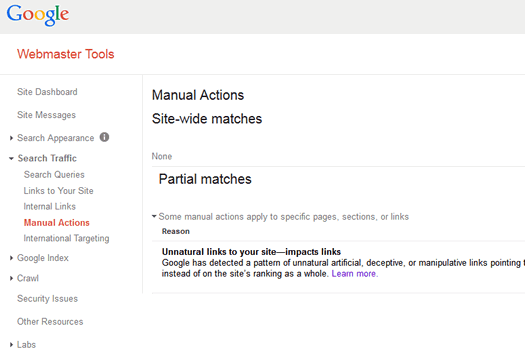
That said, if you have tackled the problem thoroughly, then you are probably ok. For example, I was helping a company with a manual action for unnatural links and we had completed the process of removing and disavowing almost all of their unnatural links. We had already written the reconsideration request and were simply waiting on a few webmasters that were supposed to take down more links before filing with Google.
As we were waiting (just a few extra days), the manual action disappeared from Google Webmaster Tools. Since we did a full link cleanup, we simply drove forward with other initiatives. That was months ago and the site is doing great SEO-wise (surging over the past few months).
Just make sure you thoroughly tackle the problem at hand. You don’t want a special surprise in your manual action viewer one day… which would be the return of the penalty. Avoid that situation by thoroughly fixing the problems causing the penalty.
Summary – Clarifying Panda and Penguin Confusion
As you can see, there were some outstanding and complex questions asked at SES Atlanta. It confirms what I see every day… that business owners and webmasters are extremely confused with algorithm updates like Panda and Penguin and how to tackle penalties. And when you combine algo updates with manual actions, you have the perfect storm of SEO confusion.
I hope the Q&A above helped answer some questions you might have about Panda, Penguin, and manual actions. And again, there were several more questions asked that I can’t fit into this post! Maybe I’ll tackle those questions in another post. So stay tuned, subscribe to my feed, and keep an eye on my Search Engine Watch column.
And be prepared, I felt a slight chill in the air this past weekend. The next Penguin update could (and should) be arriving soon. Only Google knows, but I hope they unleash the algo update soon. Like I said in my post, there are many webmasters eagerly awaiting another Penguin rollout. Let’s hope it’s sooner than later.
GG

Probably the most pertinent of the questions (and answers) in this post is the following –
“It’s not exactly fair that Google has been making those business owners wait so long for Penguin to roll out again.
Now, there’s always a possibility that there is a problem with the Penguin algorithm. Let’s face it, there’s no reason it should take so long in between updates.
In my opinion, it’s not cool to let Penguin victims that have worked hard to fix their link problems sit in Penguin limbo.
Not good, to say the least.”
It’s high time webmasters stop being passive, Google has listened in the past (hence the willingness of Google to list example unnatural links + even now sometimes the manual review team giving feedback on a reconsideration request, as well as letting the webmaster know in GWT if there are any manual actions against their website, as just a couple examples of Google listening to webmaster feedback).
Sign the Google Update Petition if you’d like to have your voice heard in regards to expediting the next much belated Penguin algo update:
http://www.penguinupdatepetition.com
It’s hard to believe Penguin hasn’t rolled out in 9 months. It really makes you wonder what’s going on. There could be problems with the algo, or maybe Panda has been the focus (while Penguin takes a back seat). Regardless, we need another update, and soon!
Fabulous post Glenn. This summarizes most of the common questions surrounding penalties in a succient and easy to understand manner. Not an easy task given the complexity of these problems.
On the Penguin update, do you think we’ll ever see a day when we have Penguin refreshes like we do with Panda? Since there is so much lag time between Penguin updates and can’t be entirely sure if the disavows/link cleanup work has entirely processed when they roll around, more regular updates could alleviate a lot of the pain and mystery surrounding this algorithm. Then again, maybe that pain is Google’s way of saying, “don’t even dare thinking about doing that again.”
Thanks Mark. I’m glad you found my post helpful! And that’s an outstanding question regarding a quasi real-time Penguin.
Once Panda matured and Google started trusting the algo more, I wrote about the possibility of Penguin following suit. But you’re right… there is a big difference between “content quality” issues and unnatural links. I’m sure Google wants Penguin victims to feel some pain based on the tactics used to gain strong rankings.
But nine months is way too long IMO… That leads me to think there could be problems with the algo. Hard to say, but I would expect a Penguin update more often (maybe every 6 months at a minimum). And if Penguin is here to stay, then pushing it out monthly would be awesome.
Based on what we’ve seen recently, I’m not sure that’s going to happen. I guess we’ll find out over time.
Thanks for another terrific article, Glenn.
“In my opinion, it’s not cool to let Penguin victims that have worked hard to fix their link problems sit in Penguin limbo.”
Truer words have never been spoken.
A lot of penguin victims have worked hard to clean up their link profiles. Many of these people really are true victims, having hired SEO “professionals” who screwed them over. Keeping these people trapped indefinitely in Penguin Prison is just cruel.
9 months have gone by since the last update. Small businesses are on the verge of bankruptcy. Families are in danger of losing their homes. There is real human suffering taking place because of this. Maybe Google just doesn’t care, and wants people to suffer as long as possible? I sure hope not. I want to believe that Google has more decency than that.
As there is no end in sight, maybe it’s time for the SEO community to reach out to Google and ask, as a gesture of goodwill, to refresh Penguin? If a group of community leaders, such as yourself, Rand Fishkin, Barry Schwartz, Danny Sullivan, and Marie Haynes, were to publicly reach out to Google and nicely ask for this, perhaps they would listen.
What do you think? Is there some way that we can get Google’s attention?
Thanks for your comment Antonio, and I’m glad my post was helpful. I totally hear you regarding Penguin. In my opinion, nine months is way too long between updates. That said, I do believe the next Penguin update is coming… Based on Matt’s comments at SMX Advanced and John Mueller’s comments yesterday (and documented above), I think the next Penguin update is coming soon.
Regarding reaching out to Google, that’s a good idea. Let’s see what the next few weeks bring us. I know there are many in the industry eagerly awaiting the next update and I’ve spoken with a number of them! Stay tuned.
I will definitely stay tuned. :) Thanks Glenn!
Hello Glenn! Thanks for article, this is really useful and interesting information. I would like to know your opinion of following situation. Can Panda punish separate pages? We have lost 40% of Google’s organic traffic on February 16, but some pages showed growth by 10-20%, and others lost 50-60% of traffic.
Sounds interesting. I don’t remember tracking an unconfirmed Panda update on Feb 16th. Also, that’s very close to the Above the Fold update on Feb 6th. Are you running a lot of ads on the site? Were you impacted by previous Above the Fold updates?
For Panda, it’s typically a site-wide demotion (but some pages can increase). When running a Panda report that highlights decreases by landing page, I often see some pages that have increased. It’s not out of the question. But overall, traffic decreases heavily across the site as a whole (and especially core pages that were receiving a lot of traffic prior to the Panda hit). I hope that helps.
Thanks for the answer Glenn! I made a mistake above, we have lost traffic on Feb 12th. We were not impacted by previous Above the Fold updates. Our site is the interregional portal where people post their ads for the sale of trucks and other equipment, so the traffic have declined on many versions of the site (Polish, Russian, Spanish and others). Therefore it is quite difficult to define what exactly is affected:
– cross-domain linking
– duplicates of content on different versions
– sites, which we made for our partners and which duplicate their ads
– or all of this
As you write in your articles “Panda is a beast, and has many tentacles”
So… I’ll dig in farther, because such significant drop in traffic is very frustrating:
Your posts are very informative Glenn. THANK YOU for taking the time to prepare them. As webmasters we appreciate the intel you share.
You mention in your Panda 4.0 posts that killer content is the key. What does killer content mean for coupon websites? Is such websites, all visitors want to do is find the coupon code, copy it and paste it at the merchant’s checkout so that they complete their purchase as soon as possible. They are not interested in reading any content/article, etc, and they have no time at all to spend on a third party website. All they want is a valid coupon code asap. What is “killer content” in this case?
Talking about valid coupon codes, these are the ones provided by the merchants, such as Macy’s, Sears, etc. If taken from affiliate networks, monthly coupon codes for hundreds of merchants are offered in the form of syndicated content. This content, obviously, is the same for all coupon code sites. That raises the issue of duplicate content between all coupon websites. But how can you change a discount code? If you do, you are giving the visitor an invalid code and that creates frustration from the side of the user.
Have you dealt with coupon code sites before? Your opinion on that would be helpful…
Yes, this is clearly a problem. There very well could be an issue with the algo that’s holding the update back. And that’s horrible news for penguin victims that have worked hard to rectify their link issues.
I still think it will update… and I’m hoping that’s before the summer ends. If not, we’ll be entering Q4 and holiday season. And if ecommerce retailers get hammered (unfairly), then it will be a huge black eye for Google. We’ll see…